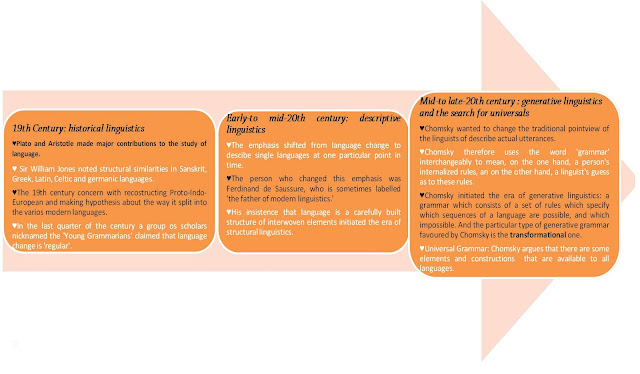From t
The London School
From the sixteenth century onwards, England was
remarkable for the extent to which various aspects of ‘practical linguistics’
flourished here.
One consequence of this tradition for the pure
academic discipline of linguistics which emerged in Britain in our own time was
an emphasis on phonetics. Phonetic study in the modern sense was pioneered by
Henry Sweet (1845-1912).
He was actively concerned with systematizing phonetic
transcription in connection with problems of language-teaching and of spelling
reform. Sweet was among the early advocates of the notion of the phoneme, which
for him was a matter of practical importance as the unit which should be symbolized
in an ideal system of orthography.
Sweet’s general approach to phonetics was continued by
Daniel Jones (1881-1967), who took the subject up as a hobby, suggested to the
authorities of University Collage, London that they ought to consider teaching
the phonetics of French.
Daniel Jones stressed the importance for language
study of thorough training in the practical skills of perceiving, transcribing,
and reproducing minute distinctions of speech-sound; he invented the system of
cardinal reference-points which made precise and consistent transcription
possible in the case of vowels. Thanks to the traditions established by Sweet
and Jones, the ‘ear-training’ aspect of phonetics plays a large part in
university courses in linguistics in Britain, and British linguistics research
tends to be informed by meticulous attention to phonetic detail.
The man who turned linguistics proper into a
recognized, distinct academic subject in Britain was J.R. Firth (1890-1960).
He, in 1944, became the first Professor of General Linguistics in Great
Britain, in the School of Oriental and African Studies (college of the
University of London).
Firth’s own theorizing concerned mainly phonology and
semantics, which we shall consider in that order.
One of the principal features of Firth’s treatment of
phonology is that it is polysystemic.
Polysystemic principle ignores a generalization about
human language which is valid as a statistical tendency even if not as an
absolute rule. Firth’s theory could be said to meet Chomsky’s goal of providing
simple descriptions for relatively ‘natural’ languages and complex descriptions
for less natural languages.
A Firthian phonological analysis recognizes a number
of ‘systems’ of prosodies operating at various points in structure which
determine the pronunciation of a given form in interaction with segment-sized
phonematic units that represent whatever information is left when all the
co-occurrence restrictions between adjacent segments have been abstracted out as
prosodies. The syllable plays an essential role as the domain of a large number
of prosodies.
Also, Firth insisted that sound and meaning in
language were more directly related that they usually taken to be. For Firth, a
phonology was a structure of systems of choices, and systems of choices were
systems of meaning.
To understand Firth’s notion of meaning, we must
examine the linguistic ideas of his colleague Bronislaw Malinowsky (1884-1942).
The most important aspect of Malinowski’s theorizing, as distinct from his
purely ethnographic work, concerned the functioning of language. For
Malinowski’s, to think of language as a ‘means of transfusing ideas from the
head of the speaker to that of the listener’ was a misleading myth; to speak, particularly
in a primitive culture, is not to tell but to do.
Words are tools, and the ‘meaning’ of a tool is its
use.
Malinowski clarifies his idea of meaning by appealing
to a notion of ‘context situation’.
To understand an utterance in an alien language is not
just to equate it with some element of one’s own language but is rather to know
its position in a complex network of sense-relationships which it contracts
with other elements of the alien language.
-London approach to syntax
This draws heavily on Firthian principles which we
have already encountered in connection with phonological analysis, but the
application of these principles to syntax has been carried out by successors of
Firth, notably Michael Hallyday, once Professor of General Linguistics at the
University of Sydney. Syntactic analysis in the London style is commonly called
‘systemic grammar’. A ‘system’ in Firthian language, remember, is a mutually
exclusive options that come into play at some point in a linguistic structure.
This is the clue to London School syntax: like Firthian phonology, it is
primarily concerned with the nature and import of the various choices which one
makes in deciding to utter one particular sentence out of the infinitely
numerous sentences that one’s language makes available.
In a systemic grammar, the central component is a
chart of the full set of choices available in constructing a sentence, with a specification
of the relationships between choices.
So in syntax the London School is more interested in
stating the range of options open to the speaker than in specifying how any
particular set of choices form the range available is realized as a sequence of
words.
Margaret Berry’s introduction to systemic theory makes
the astute point that, while Chomskyan linguistics appeals to the psychologist,
systemic linguistics is more relevant for the sociologist. The sociologist
wants to be able to describe any patterns that emerge in the particular choices
that given types of individual make in given circumstances from the overall
range provided by their language.
Hallyday introduces into syntax
the notions ‘rank’ and ‘delicacy’. ‘Rank refers to a scale of sizes of
grammatical unit, roughly speaking: the lowest-ranking unit is the morpheme,
the highest-ranking is the sentence.
As for ‘delicacy’, this is a scale of relative
preciseness of grammatical statement.
The major difficulty in systemic grammar concerns the
essential role that intuition appears to play in systemic analysis.

